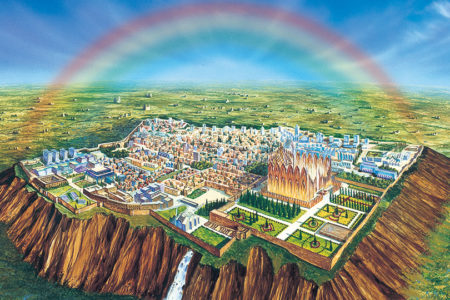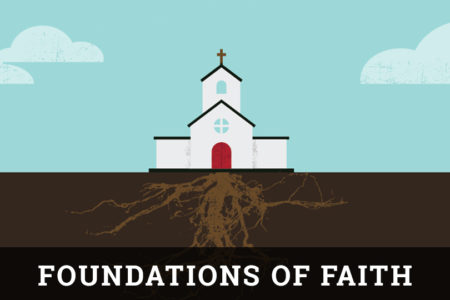The Servant’s Deity
Like a flickering candle caught in a gale, so is mankind’s attempt to fathom the depths of God’s ways. The finite mind of man is unable to grasp the ways of an infinitely more intelligent God. Yea, without His help, it is an impossible task destined for the graveyards of thought.
Perhaps this is the point behind God’s statement through Isaiah, “For my thoughts are not your thoughts, neither are your ways my ways, saith the Lᴏʀᴅ. For as the heavens are higher than the earth, so are my ways higher than your ways, and my thoughts than your thoughts” (Isa. 55:8–9). Our attempt to understand God and His ways is an exercise in futility when the only resource is human logic and ability. Myriad misunderstandings and erroneous beliefs arise when we are limited to our own meager resources.
Biblical truth is occasionally paradoxical. When an unregenerate person attempts to understand God without the illuminating work of the Spirit of God, the result is confusion. A definition of paradox captures the essence of the problem in understanding many truths of Scripture. Paradox is “a statement that is seemingly contradictory or opposed to common sense and yet is perhaps true” (Merriam Webster’s Collegiate Dictionary, Tenth Edition). The Bible is replete with truths that don’t make any sense to people who have not experienced the regenerating work of the Spirit of God in accepting Jesus as Messiah and Lord. It matters not how religious, scholarly, educated, or devoted people are. Spiritual things are spiritually discerned. It is impossible to grasp the infinite when limited to the finite.
The subject at hand is a case in point. The idea of a servant being God—or possibly better expressed, God being a servant—makes no sense to the human mind. And yet that is what we are confronted with in the teachings of the Word of God in the servant passages of Isaiah.
The Servant Passages
Servant is used in the Book of Isaiah to refer to three different entities. It refers to individuals (Isaiah himself, 20:3; Eliakim, 22:20; David, 37:35), Israel (41:8–9; 44:1, 21; 45:4; 48:20), and the Messiah. Four passages in the Book of Isaiah (42:1–7; 49:1–12; 50:4–11; 52:13–53:12) are referred to as the servant passages.
Although Israel is most often mentioned as the servant in the Book of Isaiah (especially in chapters 40 through 66), it would be erroneous to consider the servant passages as speaking of Israel. It is clear from the descriptions of the servant in the four servant passages and the teaching about Israel in Isaiah that there are two different subjects in view.
For example, Israel is shown to be sinful and corrupt (1:4), blind (29:10), and unrighteous (48:1). In contrast, the servant of the servant passages is perfect (53:9b), gives sight to the blind (42:7), and is righteous (53:11). The servant of the Lord in these passages is none other than the Messiah.
The Servant’s Humanity
One of the most important facets of the identity of the servant is his nature. His humanity is clearly seen from all of the servant passages. The first servant passage individualizes the servant and tells of his walking among the people and the worldwide work he will accomplish. The second passage speaks of his coming from his mother’s womb. The servant’s soliloquy in the third passage mentions some of his features, such as his back, face, cheeks, tongue, and hair. The final passage dealing with the servant clearly identifies him as a man.
It is the other facet of His nature that is troubling to some. How can a servant be God? Is not God the King, the Creator, the Sovereign of the universe? Could God become a servant? Would God become a servant?
This facet of the servant’s nature, which is a stumbling block to countless people, is no less true than his human side. As one example, Rabbi Hayim Halevy Donin, in his book To Be A Jew, speaking for the religion of Judaism, unequivocally states, “The Jewish notion of man becoming God or God assuming the form of man was equally repugnant to the Jewish religious spirit. The Jewish mind and faith cannot accept the notion of the infinite Divine reducing Himself to a finite mortal.” His statement is true of present-day Judaism but is divorced from the truth of his own prophets. People who put their trust in their religious traditions or their own thought processes, instead of in the Word of God, will struggle with the paradoxes of God’s Word.
More Than a Man
Possibly no other truth about the Messiah has been attacked more regularly than His deity. It has been denied, ridiculed, diluted, and ignored. The assault on truth often starts in this arena. Yet, an unbiased examination of the Scriptures reveals that, yes, God would become a man.
It is not that a man will become God. Our world is filled with religions—Mormonism, New Age, the extreme charismatic element of Christendom, and others—that have accepted this lie. It began with Satan in the Garden of Eden and is with us to this day. No, this is not the teaching of the Word of God.
God, though, would become a man. He would take on flesh and become a servant. Paradoxical? Yes. Revealed truth? Unquestionably. This is the teaching of the Word of God, and this is the teaching of Isaiah about the servant of the Lord.
It is in the second and third servant passages that the deity of the servant is most clearly seen—not so much by what is found in the passages themselves but in the context of the surrounding chapters.
Israel and Its Idols
It is foreign to the Jewish mind to embrace idolatry—at least in the outward manifestation of carved images and graven idols. Rabbi Donin says, “…the very representation of God by an image was forbidden to the Jew.” This is true today and has been true for centuries, but it was not true in Isaiah’s day.
Israel at the time of Isaiah was very idolatrous. In the first 11 verses of chapter 48, God rebuked Israel for its outward professions of worship and idolatrous practices. Part of its problem was the same as that of many people today. They “swear by the name of the Lᴏʀᴅ, and make mention of the God of Israel, but not in truth” (48:1). He also promised that He would not destroy the nation of Israel but would preserve it for His name’s sake.
Then God addressed the people of Israel. He claimed to be the first and the last (v. 12), the creator of heaven and earth (v. 13), and commanded the Jewish people to listen to what He was about to say.
At the end of verse 16, God confronts the reader with an amazing statement: “and now the Lᴏʀᴅ God, and his Spirit, hath sent me.” The “me”—the one sent by the Lord God and His Spirit—is the speaker in this chapter. The “me” is the first and the last, the creator of heaven and earth. The speaker is Jehovah God. We are confronted in this passage with the teaching of the Trinity, or better expressed, the Triunity of God. (Space does not allow a full examination of the Triunity of God. For further study on this subject, write to The Friends of Israel for the pamphlet The God of Israel: One God or Three? written by this author.)
If there is a question that the “me” and the Lord God as the speaker in this passage are not the same individual, it is answered in verse 17: “Thus saith the Lᴏʀᴅ, thy Redeemer, the Holy One of Israel.” They are one and the same. Jehovah God is speaking throughout this chapter and continues addressing the Jewish people through the 48th chapter. He promises to redeem His people from their sin and idolatry. This is the purpose and call of His servant.
Redemption by the Servant
The second servant passage, Isaiah, 49:1–12, begins with the continuing exhortation of the Lord. It is important to understand that the same speaker—God—is still addressing the Jewish people.
He commands the Gentiles also to listen to what He has to say and mentions that God has brought Him forth from His mother’s womb (v. 1). Verses 5 and 6 give the purpose of the servant’s coming: He will be the salvation of God to both Jews and Gentiles the world over.
The servant is the same one who was sent by the Lord God and His Spirit in the previous chapter. He has continued speaking into this chapter and identifies Jehovah as the speaker.
This concept of God’s becoming a man should not be surprising to the readers of the Book of Isaiah. Earlier, in chapter 9, Isaiah wrote about this very thing: “For unto us a child is born, unto us a son is given, and the government shall be upon his shoulder; and his name shall be called Wonderful, Counselor, The Mighty God, The Everlasting Father, The Prince of Peace” (9:6). A child who was to be born would be the Mighty God!
Humiliation of the Servant
The third servant passage starts in verse 4 of the 50th chapter, but we identify the servant from verse 1, which starts, “Thus saith the Lᴏʀᴅ.” The context of Isaiah 50 relates that the Lord is speaking, and He is the servant in the passage. The passage goes on to relate the humiliation of the servant, but He trusts in God for deliverance.
Max Wertheimer, a graduate of Hebrew Union College in Cincinnati, Ohio, and rabbi of B’nai Yeshorum Synagogue, was challenged by this passage before he came to the Messiah. Hear his thoughts as he grappled with its truth: “…in Isaiah 50:6 I found, ‘I gave my back to the smiters.’ In the beginning of the chapter it says: ‘Thus saith Jehovah.’ Jehovah is the only speaker in the chapter. Jehovah gave his back to the smiters? Had God a back? When and why was it smitten? Who smote it? Further I read: ‘Who gave his cheeks to them that plucked off the hair.’ And still further: ‘I hid not my face from shame and spitting.’ What did all this mean? Who had been so abused? When? Why? Did Jehovah have all these human characteristics?”
Rabbi Wertheimer has since gone home to heaven, but before doing so he learned that the answers to his questions reside in Jesus. He saw the reason for the humiliation of this servant in Isaiah 53. The servant would die for the sins of the world—Jew and Gentile.
Final Thoughts
The servant passages of Isaiah are some of the most important Scriptures in understanding the Messiah. The inescapable teaching of these passages is that God became a man, walked among us, was scorned and humiliated, but through it all honored God and offered Himself as the Sinbearer for the redemption of the world.
The way before us goes in two directions. Two rabbis came to that fork in the road. Each had to make a decision about God’s becoming a man. Rabbi Donin rejected this as impossible. Rabbi Wertheimer accepted the teaching of the God of Israel through Isaiah and the prophets. Yes, God did become a man. This was realized in the person of Jesus, just as the prophets had promised.
Which way will you choose? The way of tradition or the way of God?







